‘The Night Manager’ Finale Postmortem: The Truth About The Drying Trousers
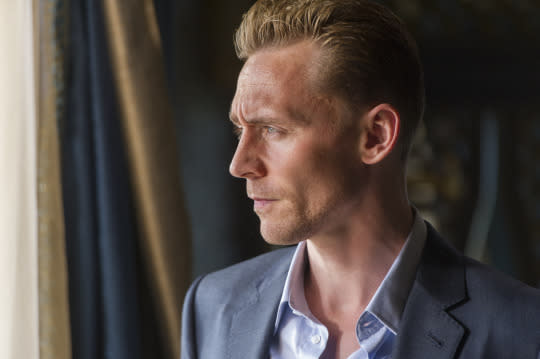
Tom Hiddleston as Jonathan Pine (Photos: Des Willie/AMC)
Spoiler alert: The ending of The Night Manager would seem to not bode well for Hugh Laurie’s Richard Roper, the international arms dealer who’s last seen in the back of a paddy wagon driven by the arms buyers he’d inadvertently stiffed and intentionally insulted. In our final weekly postmortem with executive producer Stephen Garrett, we talk about building that suspense — and whether Jonathan Pine (Tom Hiddleston) would really have shown up at the Nefertiti in a dry suit after drowning Freddie Hamid (David Avery) in his pool.
I was watching a screener of the finale on my laptop, full-screen, and I got so tense at times I had to shrink it down.
Music to my ears, thank you. You know what you want to achieve, you just don’t know quite whether it’s going to come off. I think there are a number of moments that we really wrestled with, both in the script-writing process and the filming, and then the editing. For me, one of the most agonizing moments [to watch] is when Jed can’t get back into the safe. In fact, even as I remember it, a shiver goes down my spine. Even on the page you could tell that was just going to be a killer moment, terrifying. And when Burr goes into Roper’s room armed with the code, and then Tabby comes in and she hides — we’ve all seen scenes a bit like that before, but there’s something about Burr being pregnant and Tabby being played by this huge man. I don’t know if you know this, but at his peak, the actor playing Tabby, Hovik Keuchkerian, was the heavyweight boxing champion of Spain. He really was a very big guy and, actually, a gentle giant, almost the mascot of the crew. He was such a lovely man, but physically enormous and very, very imposing. The combination of him wandering into that space and being a threat to Burr played beautifully.
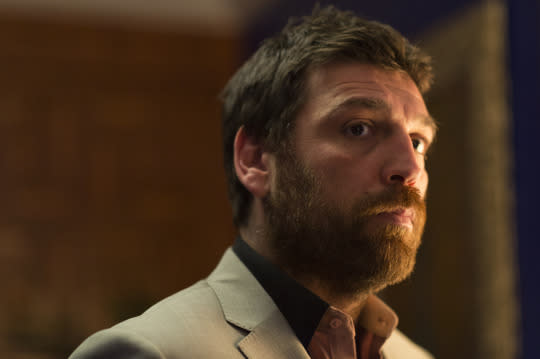
Hovik Keuchkerian as Tabby
The one we wrestled with, and really the exact form of it took shape probably the night before it was actually filmed, was when Frisky drags Jed down the hotel corridor — she tortured, beaten, battered; he with his gun and the instructions to take Burr out. We talked for a long time about how that was going to work and whether Burr should have a gun, and whether she should use it, whether Frisky was going to die or just be shot, and just how that whole scene was going to work plausibly. Again, the audience will have to be the judge as to whether it did work. I think we were all really thrilled with the way it turned out, but it was something we were not confident of until the edit.
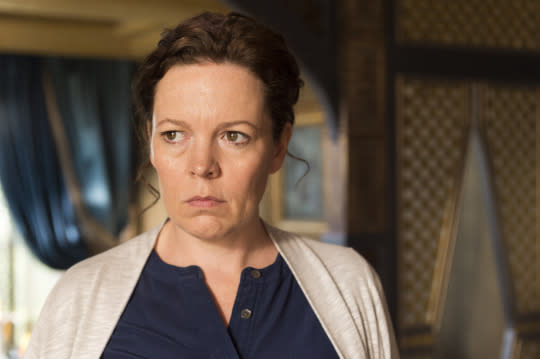
Olivia Colman as Angela Burr
On the opposite side of the emotional spectrum is that really lovely scene when Pine sees Burr again. They share that warm hug. Was that scripted?
I don’t think it was scripted. I think it was just something they did. Partly because as actors, they hadn’t played a scene together for some time, so they were really pleased to see each other again. It felt right. It’s interesting, because [the characters] haven’t had much time together. They didn’t know each other very well, but I think they’ve got this incredible bond, knowing what they’ve been through, knowing how close their whole operation has been to collapsing, and now how close they are to actually reeling Roper in, but still a lot to go wrong. I think it’s a really lovely moment. You believe the emotion.
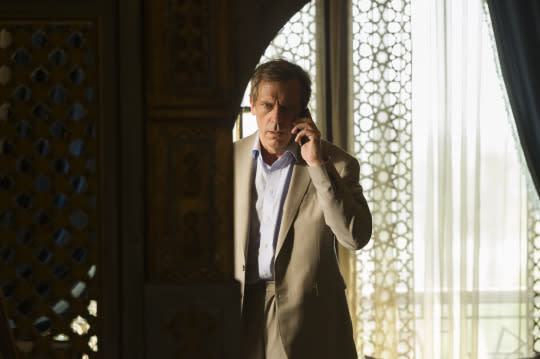
Hugh Laurie as Richard Roper
Let’s talk about Roper’s fate. How did you all decide it?
Really, the challenge, going back to the writing process and the filming and editing, was you’ve got a number of people’s stories you want to end. Again, we’ve all seen movies where you feel it’s got three or four endings. It ends, and you think, “Okay, great, I’m waiting for the titles now,” and then there’s another ending and another. We wanted to avoid that. We wanted something that felt like justice, but an appropriate justice, for Roper. Killing him would have been too easy. That hint of ambiguity that’s attached to him being dragged off by people who don’t mean him well and you know are capable of very bad things just felt right. I love the way that the audience’s imagination takes over at that point. In a way, whatever you want to happen to him can and will happen to him.
For Pine and Jed, I think it would have been too sickly and cute if they’d run off into the sunset hand-in-hand. That sense that there is a bond between them but that they can’t be together just feels very true and much more like life than many stories can be.
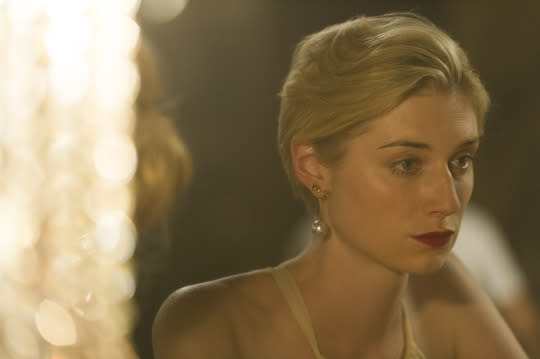
Elizabeth Debicki as Jed
He tells her he’ll come visit soon. So is that just something he says?
Again, I think it’s trusting the audience’s intelligence and imagination. Then whatever you want to happen can happen. If you’d like them to be together, it’s not ruled out. If you feel it’s better that they’re not or, again, more like life that they’re not, then that’s the ending you can have.

When we talked before the miniseries’ premiere, you said that we’d see some light moments even in the darkest hour, and you were right. Like when Roper said, “Could you just scratch my nose?” and gave Pine that wink as he’s being led out in handcuffs, and after Pine blows up the weapons in the trucks and Roper realizes he’s also transferred the first payment, Roper says, “Oh, you beauty.”
You’ve picked two moments that are both brilliant Hugh improvisations. “Oh, you beauty” — that was a completely Hugh line. He was channeling quintessential Roper at that point. The same thing with the “scratch my nose.” That was Hugh in the moment.
At the show’s U.S. premiere screening at the Tribeca Film Festival, director Susanne Bier told the story of how Hugh came to her, about a week before production began, with a list of actors he thought could play Roper better than him. She said the next night they had dinner, and he was fine.
I didn’t realize she’d told that story at Tribeca. I can confirm it, because I had a similar conversation with him the next day.
Any chance you’ll tell us who was on Hugh’s list?
I think maybe that’s a competition for your readers. Now having seen him, of course, in answer to the question, “Who could play Roper better?” it would be a rather empty list. Actually, even Hugh didn’t have a very long list. He had two or three names. He said, “Check out the availability of these people. I’m sure they’d do it better.” It wasn’t something we were prepared to do. Clearly, we thought he would be rather good. Fortunately, between us we were able to sway him that he was in the right place at the right time.
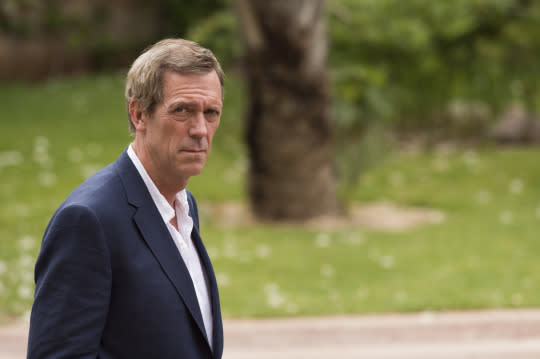
Hugh’s talked about how he actually tried to option The Night Manager novel when it was published in the ‘90s. Do you think he loved the story that much, it was a momentary fear that he wouldn’t do Roper justice?
I think part of the reason he’s so good is he’s an extraordinary perfectionist and is his own harshest critic. It was real. Partly, yes, out of his fidelity to the character in general, and this moment, in particular, he wanted to make sure it was right. I think a lot of people are very hard on themselves. That makes their lives tougher for them than for people who aren’t hard on themselves. We all have come across people who perhaps should be harder on themselves and aren’t. He’s the opposite. He’s someone who doesn’t need to be hard on himself, but is.
I think we all felt we were part of a process where we were making something pretty good. … That just happens when everyone, whether in front of the camera or behind the scenes, is performing at the top of their game. Then there is a kind of magic or alchemy that either happens or doesn’t happen, which you can’t really control. You just create the conditions for it, then it turns into something special and unique.
Related: ‘The Night Manager’: Tom Hiddleston and Hugh Laurie Talk Their Deadly But Charming Face-Off
And it’s really a team effort. I think the score is a great example of something that exceeded our wildest dreams. The music plays a huge part in a way that you never really necessarily articulate. The fact that you haven’t asked me about it is good, because it means it’s subtly doing its work. If you look at some of your favorite moments and imagine them without music or with different music, they’d fall apart or fall flat.
As you may know, what happens when you edit a show is, the editor basically, where he thinks there should be music, puts on a temporary soundtrack, which he plunders from all the best movie or TV soundtracks ever written. The show’s composer is then shown a cut with, in many cases, the best movie music ever written and he’s told, “You can’t copy that, because obviously someone else has already written that, but please do something that’s as good as that or better, without it being the same.” That’s an appallingly difficult challenge to give to composers, however brilliant they are. Our composer, Victor Reyes, rose to the challenge.
The soundscape in general: there are some extraordinary sounds [in the miniseries]. If you take [episode 5′s] fireworks sequence that our sound designers did, to put together an atmosphere that makes you feel you’re in that space in the moment — these are the unsung heroes of the process. What they do is the difference between the whole piece feeling good but not great, and great.
And finally, my last question: After Jonathan killed Freddie, did he have time to dry his suit?
I’m very glad you’ve raised that, because that has been very controversial [after the UK airing]. We get a lot of complaints on Twitter and beyond about a continuity error. As you know, when he walks back into the hotel, his trousers are dry. Interestingly, Tom, obviously, really did wade into the pool and got his trousers wet. In the dry heat of Marrakesh, which is, if anything, a bit cooler than the dry heat of Cairo, his trousers, in reality, dried [quickly]. We will be happy to recreate the experiment. We took such care to get everything right, it’s a source of huge irritation to us that we’ve been called out for something that looks like an error but in fact, in life, his trousers when he walked back into the hotel would have been dry.
I will set the record straight.
Thank you. You might be the only opportunity we have to correct that particular misconception. Your headline for the story is “The Truth About the Drying Trousers.” That’s a world scoop.
Related: ‘The Night Manager’ Episode 5 Postmortem: ‘Fireworks Party’
‘The Night Manager’ Episode 4 Postmortem: Olivia Colman’s Brilliance Revealed
‘The Night Manager’ Postmortem: Inside Episode 3
‘The Night Manager’ Episode 2 Postmortem: Everyone Book a Trip to Majorca
‘The Night Manager’ Postmortem: Inside the Premiere of the Tom Hiddleston-Hugh Laurie Spy Thriller
